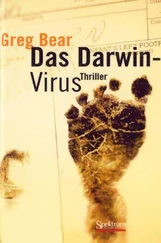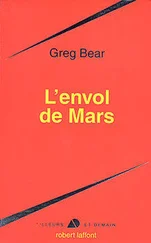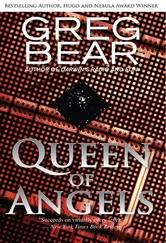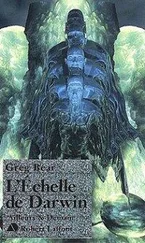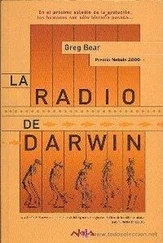“We need to be sure of that,” Beck said.
Kaye walked to the second trench, stooped, and played the beam of her flashlight over the heaps of fabric and dark bones and dry dirt. The soil was sandy and dry, possibly part of the bed of an old melt stream from the mountains. The bodies were almost unrecognizable, pale brown bone encrusted with dirt, wrinkled brown and black flesh. Clothing had faded to the color of the soil, but these patches and shreds were not army uniforms: they were dresses, pants, coats. Woolens and cottons had not completely decayed. Kaye looked for brighter synthetics; they could establish a maximum age for the grave. She could not immediately see any.
She moved the beam up to the walls of the trench. The thickest roots visible, cut through by spades, were about half an inch in diameter. The nearest trees stood like tall thin ghosts ten yards away.
A middle-aged Republic Security officer with the formidable name of Vakhtang Chikurishvili, handsome in a burly way, with heavy shoulders and a thick, often-broken nose, stepped forward. He was not wearing a mask. He held up something dark. It took Kaye a few seconds to recognize it as a boot. Chikurishvili addressed Lado in consonant-laden Georgian.
“He says the shoes are old,” Lado translated. “He says these people died fifty years ago. Maybe more.”
Chikurishvili angrily swung his arm around and shot a quick stream of mixed Georgian and Russian at Lado and Beck.
Lado translated. “He says the Georgians who dug this up are stupid. This is not for the UN. This was from long before the civil war. He says these are not Ossetians.”
“Who mentioned Ossetians?” Beck asked dryly.
Kaye examined the boot. It had a thick leather sole and leather uppers, and its hanging strings were rotted and encrusted with powdery clods. The leather was hard as a rock. She peered into the interior. Dirt, but no socks or tissue — the boot had not been pulled from a decayed foot. Chikurishvili met her querulous look defiantly, then whipped out a match and lit up a cigarette.
Staged, Kaye thought. She remembered the classes she had taken in the Bronx, classes that had eventually driven her from criminal medicine. The field visits to real homicide scenes. The putrescence protection masks.
Beck spoke to the officer soothingly in broken Georgian and better Russian. Lado gently retranslated his attempts. Beck then took Kaye’s elbow and moved her to a long canvas canopy that had been erected a few yards from the trenches.
Under the canopy, two battered folding card tables supported pieces of bodies. Completely amateur, Kaye thought. Perhaps the enemies of the head of the sakrebulo had laid out the bodies and taken pictures to prove their point.
She circled the table: two torsos and a skull. There was a fair amount of mummified flesh left on the torsos and some unfamiliar ligaments like dark dry straps on the skull, around the forehead, eyes, and cheeks. She looked for signs of insect casings and found dead blowfly larvae on one withered throat, but not many. The bodies had been buried within a few hours of death. She surmised they had not been buried in the dead of winter, when blowflies were not about. Of course, winters at this altitude were mild in Georgia.
She picked up a small pocket knife lying next to the closest torso and lifted a shred of fabric, what had once been white cotton, then pried up a stiff, concave flap of skin over the abdomen. There were bullet entry holes in the fabric and skin overlying the pelvis. “God,” she said.
Within the pelvis, cradled in dirt and stiff wraps of dried tissue, lay a smaller body, curled, little more than a heap of tiny bones, its skull collapsed.
“Colonel.” She showed Beck. His face turned stony.
The bodies could conceivably have been fifty years old, but if so, they were in remarkably good condition. Some wool and cotton remained. Everything was very dry. Drainage swept around this area now. The trenches were deep. But the roots -
Chikurishvili spoke again. His tone seemed more cooperative, even guilty. There was a lot of guilt to go around over the centuries.
“He says they are both female,” Lado whispered to Kaye.
“I see that,” she muttered.
She walked around the table to examine the second torso. This one had no skin over the abdomen. She scraped the dirt aside, making the torso rock with a sound like a dried gourd. Another small skull lay within the pelvis, a fetus about six months along, same as the other. The torso’s limbs were missing; Kaye could not tell if the legs had been held together in the grave. Neither of the fetuses had been expelled by pressure of abdominal gases.
“Both pregnant,” she said. Lado translated this into Georgian.
Beck said in a low voice, “We count about sixty individuals. The women seem to have been shot. It looks as if the men were shot or clubbed to death.”
Chikurishvili pointed to Beck, and then back to the camp, and shouted, his face ruddy in the backwash of flashlight glow. “Jugashvili, Stalin.” The officer said the graves had been dug a few years before the great People’s War, during the purges. The late 1930s. That would make them almost seventy years old, ancient news, nothing for the UN to become involved in.
Lado said, “He wants the UN and the Russians out of here. He says this is an internal matter, not for peacekeepers.”
Beck spoke again, less soothingly, to the Georgian officer. Lado decided he did not want to be in the middle of this exchange and walked around to where Kaye was leaning over the second torso. “Nasty business,” he said.
“Too long,” Kaye spoke softly.
“What?” Lado asked.
“Seventy years is much too long,” she said. “Tell me what they’re arguing about.” She prodded the unfamiliar straps of tissue around the eye sockets with the pocket knife. They seemed to form a kind of mask. Had they been hooded before being executed? She did not think so. The attachments were dark and stringy and persistent.
“The UN man is saying there is no limit on war crimes,” Lado told her. “No statue — what is it — statute of limitations.”
“He’s right,” Kaye said. She rolled the skull over gently. The occiput had been fractured laterally and pushed in to a depth of three centimeters.
She returned her attention to the tiny skeleton cradled within the pelvis of the second torso. She had taken some courses in embryology in her second year in med school. The fetus’s bone structure seemed a little odd, but she did not want to damage the skull by pulling it loose from the caked soil and dried tissue. She had intruded enough already.
Kaye felt queasy, sickened not by the shriveled and dried remains, but by what her imagination was already reconstructing. She straightened and waved to get Beck’s attention.
“These women were shot in the stomach,” she said. Kill all the firstborn children. Furious monsters. “Murdered.” She clamped her teeth.
“How long ago?”
“He may be right about the age of the boot, if it came from here, but this grave isn’t that old. The roots around the edge of the trenches are too small. My guess is the victims died as recently as two or three years ago. The dirt here looks dry, but the soil is probably acid, and that would dissolve any bones over a few years old. Then there’s the fabric; it looks like wool and cotton, and that means the grave is just a few years old. If it’s synthetic, it could be older, but that gives us a date after Stalin, too.”
Beck approached her and lifted his mask. “Can you help us until the others get here?” he asked in a whisper.
“How long?” Kaye asked.
“Four, five days,” Beck said. Several paces distant, Chikurishvili shifted his gaze between them, jaw clenched, resentful, as if cops had interrupted a domestic quarrel.
Читать дальше
Конец ознакомительного отрывка
Купить книгу

